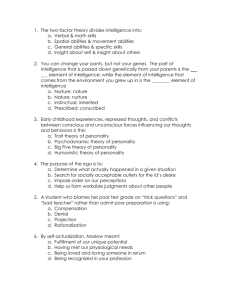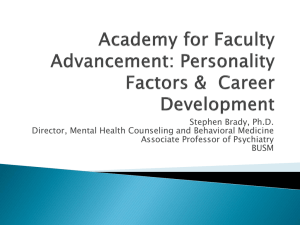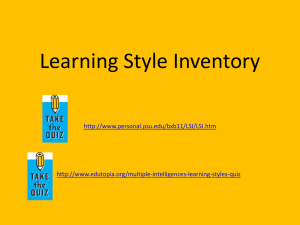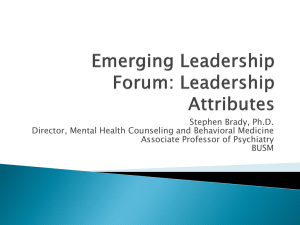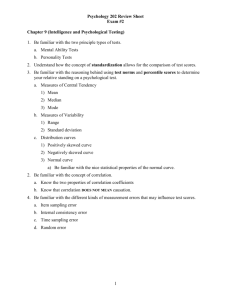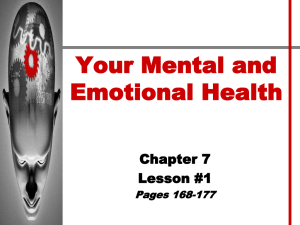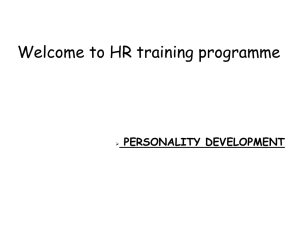Psychological Testing
advertisement
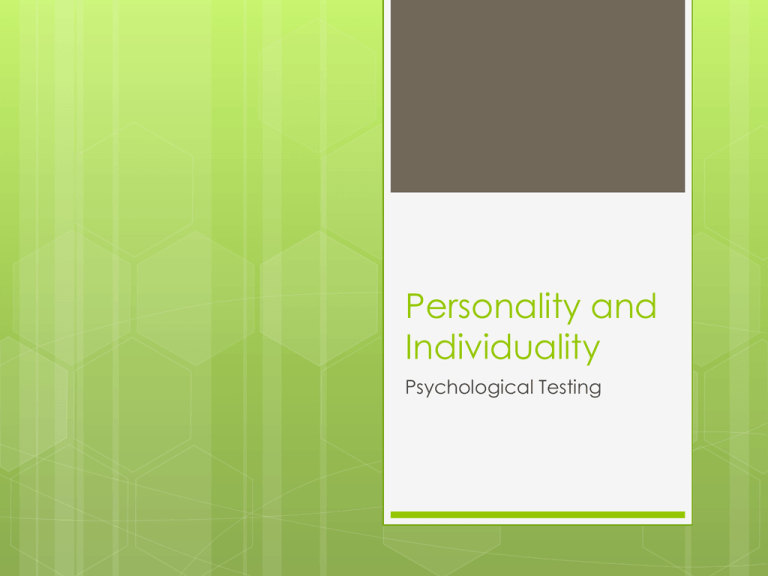
Personality and Individuality Psychological Testing What do you know? What do we mean by Personality? Consistent, enduring, unique characteristics Personare = to speak through What constitutes Individuality? Differences in the way people think, feel and act Learning Outcomes PERSONALITY AND ASSESSMENT • Explain personality as the individual's unique way of thinking, feeling, and acting. • Explain the characteristics of the psychodynamic, cognitive-behavioral, humanistic, and trait approaches. • Describe and assess various forms of personality assessment. INDIVIDUAL DIFFERENCES • Explain how intelligence and personality may be influenced by heredity and environment. • Describe theories of intelligence. • Explore how intelligence is measured. Reliability Results are consistent: When test repeated soon (test-retest) When test marked at different times (scorer) When test marked by different people (interscorer) When test divided in half and marks compared (split-half) Validity Test measures what it is intended to measure Test accurately predicts performance Standards for Comparison Raw score plotted on percentile scale Results relevant in comparison to others Norms are established by: large group of test takers standardized tests (administration and scoring)…provincials exams and… Quiz 13-1 Consider these people… What is Intelligence? The ability to acquire new ideas and new behaviour and adapt to new situations Graphic Organizer 13 “Theories of Intelligence” Binet Mental age / chronological age x 100 Test questions get different results by age Original intent – identify slow learners for “special ed” class Issues: cultural bias and nature vs nurture Weschler Weschler test (children) WAIS-R test (adults) Spearman Two Factor: general intelligence + specific mental abilities Sternberg Triarchic Theory: Analytical, Creative, Practical Verbal comprehension Numerical ability Spatial relations Perceptual speed Word fluency Memory Inductive reasoning Thurstone Seven Primary Mental Abilities Gardner Emotional (EQ) Perceive and express emotions accurately and appropriately Use emotions while thinking Understand emotions and use the knowledge effectively Regulate one’s emotions to promote personal growth Quiz 13-2 Aptitude Test quality based on predictive validity GATB – verbal, mathematical, manual skills (wide range of occupations) Admissions testing Interest Inventory Kuder Preference Record – preferences and attitudes Career Cruising – career planning website No “wrong” answers Compare your responses to those of people in a particular occupation Achievement Test quality based on content validity Achievement = what you have done Aptitude = what you can/might do Interest – what you would enjoy doing Adaptive testing (computer based) finds difficulty level where most but not all answers correct…more accurate than standard testing …take an achievement test now Quiz 13-3 Personality Objective answers): tests (forced choice MMPI - major patterns of personality and emotional disorders, diagnose psychiatric disorders CPI - responsibility, self-control, tolerance MBTI aka Myers-Briggs Personality Projective tests (open-ended): Rorschach – interpret inkblots (any response will reveal personality) TAT – interpret scenes on cards Quiz 13-4
